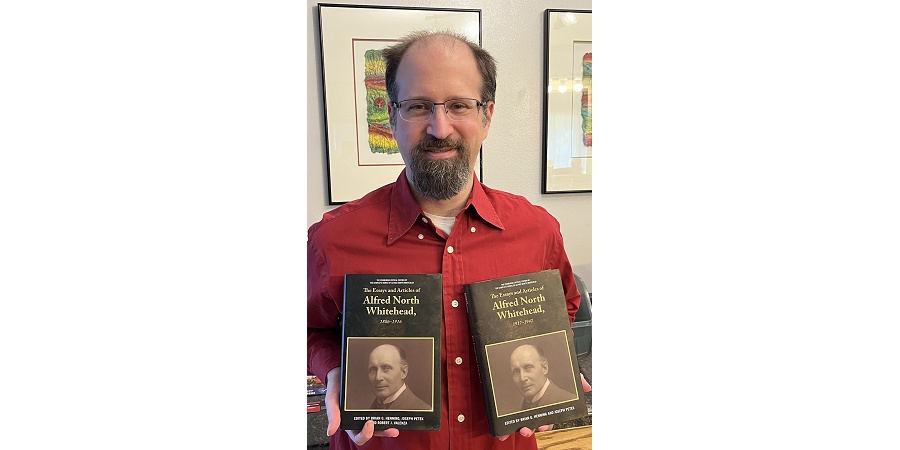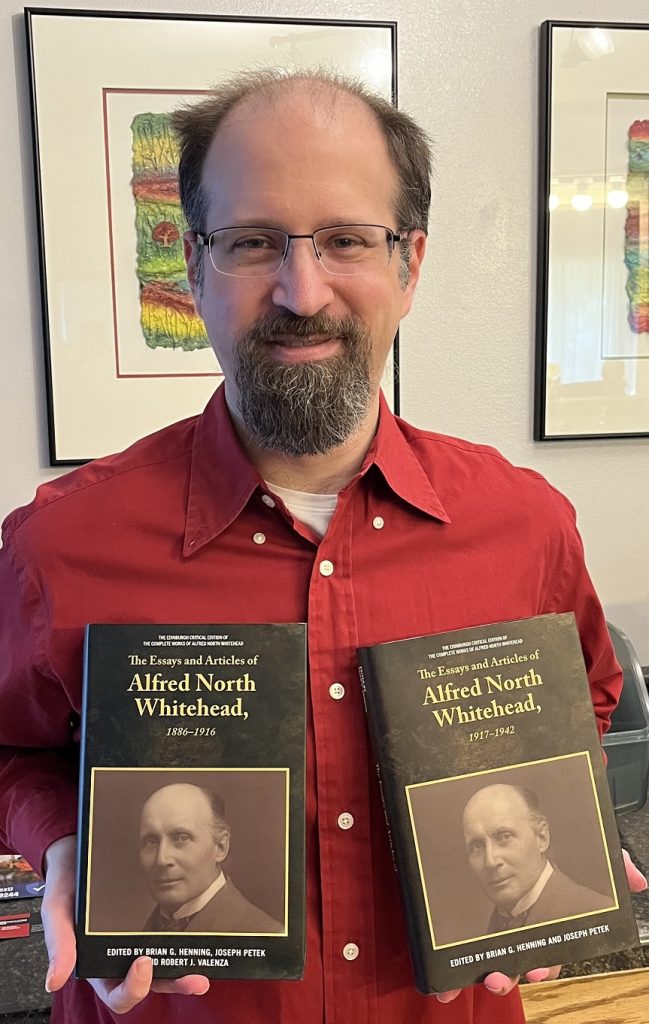This article originally appeared on the Edinburgh University Press blog
When the first two volumes of Alfred North Whitehead’s Harvard lectures were published in 2017 and 2021, they changed the landscape of Whitehead scholarship by adding what was effectively new primary source material to the established Whitehead philosophical canon, a collection of texts that largely had not changed since Whitehead’s death and the publication of his last book in 1947.
The two newly published volumes of Whitehead’s essays and articles are set to change that landscape again, but in a slightly different way—and in some senses a more radical way.
Like the Harvard lectures volumes, there is new, never-published material in these collections of essays and articles. One of these is an 1899 paper on set theory that was rejected by the Royal Society for publication, the hand-written original of which languished in the bowels of its archives for over a century before we re-discovered it. Another is the text of a 1939 address delivered to an ecclesiastical society in which Whitehead made his harshest known criticisms of church leadership, writing that ‘In reading ecclesiastical history one longs for the Athenian pagans who removed their finest moralist by the kindly device of a cup of hemlock.’ Such intriguing material could hardly help but draw interest.
But unlike the Harvard lectures, the two Essays and Articles volumes also upend and reshape Whitehead’s canon by breaking up and chronologically reorganizing The Organisation of Thought (1917), The Aims of Education (1929) and Essays in Science and Philosophy (1947). At first blush, breaking up three of Whitehead’s established texts might seem like an overly aggressive and interventionist move, but in reality, it was the only sensible choice.
In the case of the first two books, it can be easy to forget that The Organisation of Thought (OT), with its eight chapters, and The Aims of Education (AE), with its ten chapters, actually share six chapters in common. In publishing a new, critical, and definitive edition of all of Whitehead’s writings, the duplication of so much repeated material was not a real option.
As for Essays in Science and Philosophy (ESP), it was always an odd grab-bag of a book that lacked any real thematic consistency. Published in the last year of Whitehead’s life, the only unifying factor of its chapters was that they had not been re-published in any book of Whitehead’s previously. One reviewer described it this way:
Misleadingly heralded as a ‘new book’ by Professor Whitehead, this is in fact a collection of previously printed papers, ranging in date of initial publication from 1911 to 1941, whose novelty consists chiefly in the occurrence, in this reprinting, of typographical errors happily absent from the original. The reader who here encounters for the first time the essay on ‘Mathematics and the Good’ will be relieved, I am sure, to know that the ‘deflections’ of the author referred to on page 102 were ‘reflections’ in the volume from which this imperfect copy is derived.1
These two new books thus combine all of the material found in OT, AE, and ESP with all of Whitehead’s other known essays and articles into a single chronologically ordered set. The new volumes track all changes, even very minor ones, between different versions of each essay—some of which were published in as many as eight different places. Finally, they add editorial introductions and footnotes to each individual essay and article that surface their publication history and historical context.
For Whitehead scholars who have been citing OT, AE, and ESP for a very long time, their replacement by these new texts will undoubtedly feel odd for a while. But much as Griffin and Sherburne’s ‘corrected edition’ of Process and Reality slowly became the standard version of that book, we both hope and expect that these two new volumes of The Essays and Articles of Alfred North Whitehead will be accepted as the new scholarly standard; or, one might say, ‘version 2.0’ of the Whitehead philosophical canon.



Thank you for this explanation and update!
Congratulations yet again to Brian and Joe. When I retired from the project a couple of years ago, I was not in favor of interrupting the publication of Whitehead’s student class notes simply to publish a collection of essays and articles that with only a few exceptions had already been refereed and published in several forms. The exceptions were the few unpublished essays I discovered and obtained from Whitehead’s grandson, George, and the long-lost “first lecture” by Whitehead upon arrival at Harvard. Otherwise, nothing really new or transformative here, so why bother to make these a priority?
Wrong! Again!
The editors have portrayed the full range of these pieces, while uncovering the editorial errors and even violence done to the original texts. And they have in fact reconstructed the original historical context of each contribution in the process, contributing mightily to our revised understanding of W’s own intellectual development. This was a huge undertaking, and the Editors are to be congratulated!